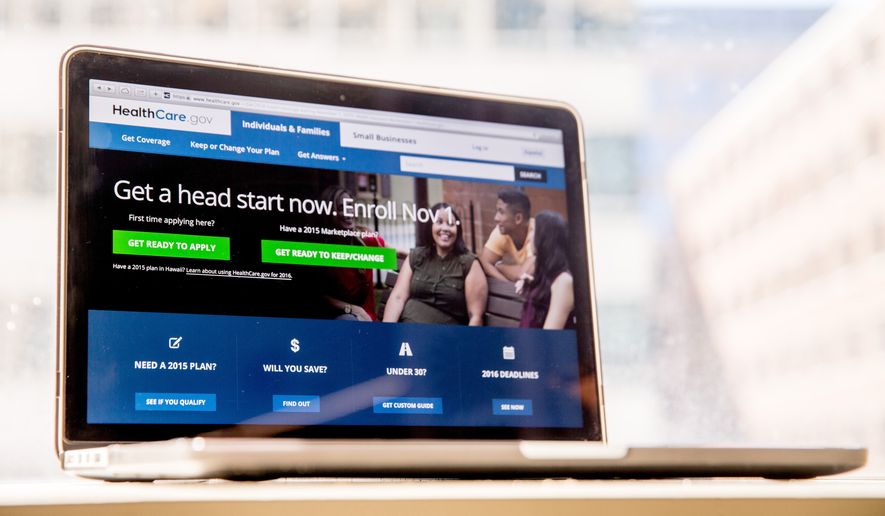Nearly a third of the country could have just a single company offering plans on their Obamacare exchange next year, according to an analysis this week that says the exodus of big players such as UnitedHealth and Aetna is denting the health law.
Competition from multiple insurers was supposed to be a key to the reforms, but customers in nearly 1,000 counties won’t have any choice of provider, the nonpartisan Kaiser Family Foundation estimated — affecting some 2.3 million people.
That’s up dramatically from about 300,000 customers in 225 single-insurer counties this year, and Kaiser said the trend is worrisome for those who depend on the health care law to lower their costs.
“The concern is that in future years, when there are more areas where insurers essentially have monopoly power, that that could lead to higher premiums,” said Cynthia Cox, associate director of health reform and private insurance at Kaiser.
Analysts won’t have a full picture of which insurers are in or out of the exchanges until open enrollment starts Nov. 1, but exchange customers already face higher premiums next year as insurers adjust.
Companies that underpriced in the early rounds are accounting for a sicker-than-expected customer base and girding for the expiration of a “reinsurance” program that mitigated losses from high-cost enrollees.
SEE ALSO: Doctors sue over Obamacare sex-change rule, claim procedure runs counter to beliefs
The Department of Health and Human Services says consumers are still better off than they were prior to Obamacare, though GOP critics say President Obama’s vision of a competitive new marketplace is falling far short.
“This is only the beginning. Obamacare is killing competition and that means lousy choices and awful premiums for American families,” Sen. Ben Sasse, Nebraska Republican who sounded early alarms about the lack of choices under Obamacare.
Kaiser said its study, which it conducted at the request of The Wall Street Journal, is based on what can be gleaned by filings that have been made public, so insurers might enter new markets and bolster competition in the coming months.
Most enrollees will still have several plans to choose from, but in a growing number of cases all of the plans will be offered by the same parent company.
Kaiser estimates that customers throughout Alabama, Alaska, Oklahoma, South Carolina and Wyoming will have just one insurer in each their respective counties in 2017, and states like Arizona, Mississippi and Missouri will see a marked increase in the proportion of single-insurers counties on their exchanges.
In Pinal County, in Arizona, state and federal officials are scrambling to recruit a company to step in and provide at least one option. Aetna was supposed to move into the county, but then backtracked as part of its decision this month to withdraw from 11 out of the 15 states where it had Obamacare customers.
SEE ALSO: Election systems hacked in Illinois, Arizona: ‘The FBI is very much worried’
UnitedHealth Group already decided to ditch all but a handful of the exchanges, and Humana is pulling back, too.
Oscar Insurance Corp., a hip, tech-driven startup company, recently said it will withdraw from Dallas area and New Jersey, though it is sticking around in New York, San Antonio, Los Angeles and Orange County, California, while expanding into San Francisco.
Cigna, however, has signaled it will enter new markets.
HHS said some insurers are adjusting to the new market rules better than others. It is betting that insurers will continue to participate in the exchanges, saying it is a “growth opportunity” so long as enrollment increases.
“A number of steps remain before the full picture of this year’s marketplace competition is known, but the ACA has greatly expanded the insurance options available to consumers in the individual marketplace, and we remain confident that the majority of marketplace consumers will be able to select a plan for less than $75 per month when open enrollment begins November 1st,” HHS spokeswoman Marjorie Connolly said in response to the Kaiser analysis.
Yet even Mr. Obama has acknowledged the lack of choices in some parts of the country. Last month, he said a government-run plan, or “public option,” is needed compete alongside corporate players in places with few choices on the exchange.
His chosen successor, Democratic nominee Hillary Clinton, also says she supports the public option, though analysts say the politics of actually implementing one would be difficult.
Republican presidential nominee Donald Trump said it is time to start over on health care reform. He called the Kaiser study “another extraordinary indictment” of Obamacare.
• Tom Howell Jr. can be reached at thowell@washingtontimes.com.




Please read our comment policy before commenting.